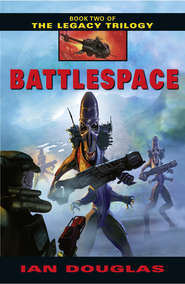По всем вопросам обращайтесь на: info@litportal.ru
(©) 2003-2025.
✖
Centre of Gravity
Настройки чтения
Размер шрифта
Высота строк
Поля
Chapter Two (#ulink_503f6997-1f29-54ea-86ba-0565907303c0)
21 December 2404
Palisades Eudaimonium
New York State, Earth
1725 hours, EST
The spaceport’s pubtran flier touched down lightly on the landing platform, a broad concourse suspended several hundred meters above the ground in front of the Grand Concourse. Trevor Gray stepped out of the flier and stopped, momentarily transfixed by the spectacle below, a dazzling constellation of lights stretching from horizon to horizon. Near at hand, concentric circles of lights, illuminated buildings, glowing red and green holiday decorations and animations, and the shifting displays of adwalls all combined to create a bewildering tangle of moving light. In the distance, toward the southeast, lay an ominous swath of darkness punctuated by the light—Columbia, Manhattan, and on the horizon, the ocean.
Someone thumped his shoulder hard from behind.
“Move it, Prim,” Lieutenant Jen Collins snapped. “You’re blocking progress.”
Gray turned sharply, fists clenched, but then stepped aside as the others filed out of the flier. Lieutenant Commander Allyn was coming off the flier last, and was watching him. “Uniform, Lieutenant,” she reminded him. “This is a formal affair.”
“Ah, you should have let the Prim wear his jackies,” Collins said with a bitter laugh.
“Yeah,” Lieutenant Kirkpatrick added, grinning. “The dumb-ass doesn’t know any better. It’ll be fun watching him try to mix with our kind.”
“Hey, back off,” Lieutenant Ben Donovan said. “We’re all a bit nervous tonight.”
Gray looked down at his uniform, which was currently configured for flight utility—the plain and unadorned dark gray skinsuit worn by pilots jacked into their fighters—“jackies,” in flight-line slang. Angrily, he slapped the set-patch on his left shoulder, calling up a menu within his inner display. Mindclicking on Full Dress, Formal engaged the nanotechnic interface. With a somewhat tingling sensation, his clothing rearranged itself, tightening, unfolding, and taking on texture and color.
Confederation Navy formal full dress was a glossy black skinsuit, throat to soles, with an intricate layer of bright gold knotwork sheathing the left third of his body—arm, side, and outer leg, extending all the way from shoulder to ankle. His rank tabs glowed to either side of his throat, and a panel over his left breast displayed a fluorescent animation of awards and decorations. He’d only been in for five years, so the cycling award display was a short one: Confederation Military Service, the Battles of Everdawn and of Arcturus Station, and the newly awarded Legion of the Defense of Earth, with cluster for distinguished service.
“That looks better!” Donovan said, grinning.
“I feel like a damned adwall,” Gray replied, referring to the ubiquitous multistory display panels serving as animated or live-action advertising displays on the walls of arcologies and city buildings.
“But a squared-away, Navy adwall,” Donovan said. He slapped Gray on his gold-entwined arm. “C’mon! Let’s check out the party!”
The Grand Concourse was an immense, domed-over plaza of light, crowds, and color. At the near end, the boulevard wrapped around a depression, a terraced bowl well over two hundred meters across, with standing, sitting, and reclining room for some thousands of people at once. A touch and a thought could grow a chair from the floor, soften to a sunken lounger, or extrude tables complete with a seemingly endless variety of food and drink. Everywhere there was light; the Yule celebrations marked the holy seasons of at least three major religious groups, all of them festivals of light, and the air was filled with twisting, cascading, and shimmering veils of liquid radiance and starbow hues.
“Best behaviors, Dragonfires,” Allyn’s voice whispered in their heads. “Corders, secmons, and deets on at all times, and we will know if you switch them off.”
Several of the pilots nearby grumbled at that. Corders were recording sensors grown within the weave of military uniforms. If anyone got into trouble tonight, there’d be a full audiovisual record of the incident for the court-martial afterward. Secmons were security monitors, non-AI software routines designed to warn personnel about possible security breaches. Deets were detoxifiers. There were quite a few sense-altering drugs, scents, and beverages on display, but the micrometabolic processors nano-grown within each pilot’s brain would sample chemicals in the bloodstream, monitor sensory input, and harmlessly filter out the offending chemical before he or she developed more than a light buzz.
For the Navy, professionalism and decorum were the watchwords. Always.
As Gray descended into the crowded concourse bowl, he felt momentarily disoriented. Walls were grown as easily as chairs or appetizers, and could be called into being to create small and cozy alcoves or private spaces, creating a labyrinthine effect, and as walls and rooms came and went, it became difficult to navigate. Some walls appeared to be solid, carved stone; others were screens apparently of wickerwork or painted panels, or of woven vines or other vegetation. The air seemed to grow hazier, the deeper into the bowl he traveled. At the moment, the air glowed with a deep red light, though an ultraviolet component was making the black of his uniform fluoresce with a deep, electric shimmer of ultramarine. Overhead, constellations of lights gleamed brightly, mostly in red and green, for some reason.
There seemed to be no particular theme, save that of people.
The crowd within that one hall must have numbered five thousand—roughly the same as the crew on board America. He saw a few other military uniforms, most of them the richly patterned black and gold of senior naval officers, or the ancient red, white, and blue of Marine full dress. They stood out within the far, far larger number of civilians, who wore a bewildering array of costumes, from brilliant, swirling plumage, much of it glowing under the UV light, to swirling patterns of iridescent skin nano to complete nudity.
The men seemed to be more conservatively dressed, he noticed—formal skinsuits or robes, though there were a few bright-colored ones aglow in light or with pulsing animations writhing about their bodies. The women, though, all were spectacular in their multihued displays. One strikingly attractive woman in front of him was wearing a startling, meter-high headdress that appeared to be a spray of suspended fiber-optic threads, the light shimmering in a halo effect around her—and nothing else. She saw him looking at her, raised her glass in a mock toast, and winked.
The woman she was talking with appeared to be wearing nothing but white light, as though her skin has become brilliantly luminous, with stars set in her hair and hovering about her head.
“Someone is pinging you,” his personal assistant told him.
“Who?”
“I’m sorry. Her id is blocked.”
“‘Her’? A woman? Where is she?”
An inner tug gave him a direction. That way. “Range: eighty-seven meters,” his PA said.
Odd. Personal ids—the term was pronounced as a word, rhyming with “lid”—were normally open to all within the electronic world of personal assistants and implanted communications and information hardware. The ping might mean she was interested in him, or it might mean she was just curious, tagging his personal information. That she was not revealing her own personal data, though, meant she wanted to remain anonymous, at least for now.
Who would be looking for him here? If it was Allyn or another shipmate, their military ids would have registered with his PA immediately, a kind of personal IFF. A civilian, then … but he didn’t know anyone at this gathering.
Nor, really, did he care to. The only time in his life when he’d actually sought out civilians in the civilized parts of New York had been when he’d taken Angela to the Columbia Arcology in a desperate attempt to save her when she’d had a stroke. The inhabitants of the Periphery—the fallen-away outer fringes of the old United States, which included the Manhat Ruins—weren’t considered to be full citizens, and normally they didn’t have access to modern medical services. All but the most severe cardiovascular emergencies were easily treated in a modern medical center like the one in Columbia; in a Prim community in the Periphery, a stroke could kill you or leave you helplessly paralyzed.
He’d gotten Angela to the med center while she was still alive … and they’d repaired her. The cost, however, had been him, a ten-year term with the Confederation military.
Of course, the treatment had also cost him Angela. They’d done something to her brain while saving her … something that had shut down her affection for him. Or, maybe that had been an effect of the stroke. That’s what they’d told him, anyway, that that sort of thing often happened when old neural pathways were burned out, new paths channeled in. Whichever it had been, his once-wife had chosen to leave him rather than going back to the canals and vine-covered islands of the Ruins.
Hell, he couldn’t even blame her for that. She’d downloaded the skill sets allowing her to become a compositor, a career classification completely unknown to him. She’d moved north to New New York City’s Haworth District, he’d heard, and was living with an extended family there.
At least she hadn’t been in Columbia when the impactor wave had brought the arcology tower down. Or at least, so he hoped. He hadn’t heard from her since he’d left for the Naval Training Center five years earlier. He’d been told she’d moved to Haworth and that she didn’t want to see him … but he didn’t know.
“Shall I reply?” his PA asked.
“Negative,” he said. He couldn’t imagine this crowd having anything pleasant to say to him.
He’d tried to get out of coming tonight. Lieutenant Commander Allyn had told him yesterday, in the squadron ready room on board America, that he’d been volunteered for the fly-by show, with attendance at the Yule Festival afterward.
“Why me?” he’d asked. “I’ve got nothing to do with Earthies anymore.”
“Oh, I don’t know,” the Dragonfires’ skipper had replied. “Maybe because you had something to do with saving all of their asses?”
That again. “Fuck that, sir,” he said, using the Navy’s preferred gender-neutral honorific, though ma’am would have done as well. “I was doing my job.”
“And maybe your job includes being a visible symbol of the Confederation Navy,” she’d told him. “Don’t give me grief, Gray. You’re on the flight roster, like it or not.”
And here he was.
In a nearby temporary alcove, Donovan was holding a young woman very closely indeed. She was wearing a sheath of golden, rippling light, and appeared to have extended the field to include Ben in her embrace. Gray looked away, embarrassed, and found himself looking into another alcove, this one with two men and a woman on a round sofa bed, engaged in some extremely passionate foreplay.
Angry, he turned his head again and strode forward, determined to find something to eat. He felt so damned out of place here. …
Within the Periphery, the necessities of survival tended to draw people into close, monogamous couples. Elsewhere, at least through much of North America, family groupings tended to be larger and extended, polyamorous, and impermanent. Throughout much of the background culture of the Confederation, the half-barbaric denizens of the Periphery were seen as amusingly quaint, or worse: as narrow-minded or even sexually perverted. They were commonly called “Prims,” which was short for “primitives,” of course, but the epithet held the double meaning of someone who was self-righteously prudish or closed sexually. “Monogies” was another derogative term for Prims who preferred a monogamous lifestyle; why would anyone want to restrict their life and their love to a single person?
Gray was neither prudish nor self-righteous. He knew other communities did things differently when it came to sex and marriage, and had no problem with the fact. Extended social group marriages and sexcircles simply weren’t for him. The thought of casually coupling with a woman he didn’t know—and couldn’t trust—left him vaguely uneasy.











